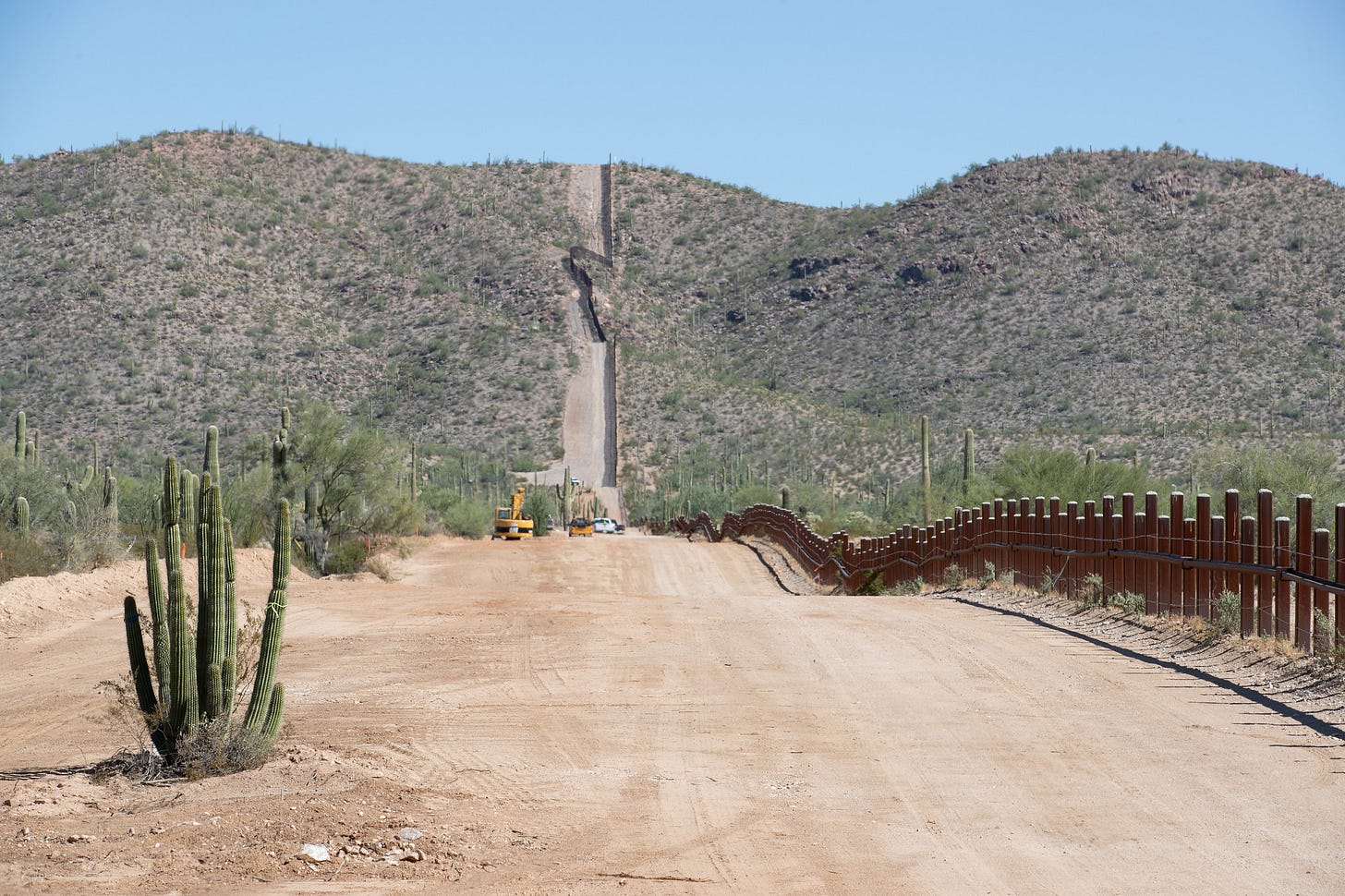Sen. Mike Lee Moves to Bulldoze, Surveil Wilderness Amid Border Crackdown
The Utah Republican is championing a bill to open millions of federal acres along both U.S. borders to roads, barriers and other “tactical” security infrastructure.

In June, when Utah Republican Sen. Mike Lee moved to force a sell-off of up to 3.2 million acres of public land, he insisted he was solely interested in combatting America’s housing crunch and that the bill only targeted “unused, garden-variety” federal parcels — not national parks, wilderness areas and other “crown jewel” lands.
Few bought what Lee was trying to sell.
Now, just a few months after being forced to pull the plug on his land-sale scheme amid sweeping bipartisan backlash, Lee is leaning into new issues to further his well-documented anti-public lands agenda: border security and disability access.
On Oct. 2, Lee introduced legislation aimed at opening millions of federal acres along both U.S. borders, including national parks and wilderness areas, to road construction, timber harvest, surveillance systems and any other “tactical infrastructure” deemed necessary to protect those lands from what he describes as “environmental destruction” resulting from “the Biden Administration’s open-border policies.”
“Biden’s open-border chaos is destroying America’s crown jewels,” Lee said in a statement announcing his bill, dubbed the Border Lands Conservation Act. “This bill gives land managers and border agents the tools to restore order and protect these places for the people they were meant to serve.”
While Lee pitches the legislation as an immigration enforcement bill, it would encompass federal lands far from the U.S.-Mexico border — including a huge swath along the U.S.-Canada border. The legislation defines “covered federal land” as any federal land “located in a unit, or in a portion of a unit, or within 1 or more parcels of land that shares an exterior boundary with the southern border or northern border.”
In other words, if a “unit” — a national park, forest, monument or any other designated area — touches a border, the entire unit is covered, regardless of how far it extends from a border. That would encompass all of Big Bend National Park in Texas, Glacier National Park in Montana, North Cascades National Park in Washington and Minnesota’s Boundary Waters Canoe Area Wilderness, to name a few. One of the more extreme examples Public Domain identified is Flathead National Forest, located in northwestern Montana, which spans 2.4 million acres, extends approximately 120 miles from the U.S.-Canada border, and includes 1 million acres of wilderness.
“The big picture is Mike Lee will use any pretext to undermine public lands and conservation,” Neal Clark, wildlands director at the Southern Utah Wilderness Alliance, told Public Domain. “It was housing six months ago, now it’s border security.”
The legislation would amend the 1964 Wilderness Act, which protects more than 110 million acres of designated wilderness areas from development, to allow for DHS to conduct patrols using motorized vehicles, including cars, airplanes and boats, and “deploy tactical infrastructure,” which the bill defines as “infrastructure for the detection of illegal southern border and northern border crossing, including observation points, remote video surveillance systems, motion sensors, vehicle barriers, fences, roads, bridges, drainage and detection devices.”

It would also give the Department of Homeland Security unfettered authority to conduct immigration, terrorism and drug enforcement activities across all federal land within 100 miles of either border, barring land management agencies from restricting DHS’s work. And it would create a “Border Fuels Management Initiative” to combat the risk of wildfires on federal border lands, one of several environmental impacts that Lee and other sponsors of the bill say have been exacerbated by illegal immigration.
The bill comes despite a steep decline in the number of unauthorized migrants crossing the U.S.-Mexico border amid the Trump administration’s immigration crackdown. Border Patrol is on track to finish the year with fewer than 250,000 apprehensions at the southern border. That figure is down from 1.5 million last year and may become the lowest number of southern border arrests recorded since 1970.
Lee has repeatedly applauded President Donald Trump’s border policies, writing in an April post to X that “this is what a secure border looks like.”
A spokesperson for Lee did not respond to Public Domain’s requests for comment.
Only one senator from a border state — Sen. Ted Cruz (R-Texas) — cosponsored Lee’s bill. Sens. John Barrasso (R-Wyo.), Marsha Blackburn (R-Tenn), Cindy Hyde-Smith (R-Miss), Cynthia Lummis (R-Wyo.), Tom Cotton (R-Ark.) and Rick Scott (R-Fla.) are also cosponsors.
Clark, the SUWA staffer, views the legislation as a “backdoor” to roading sensitive landscapes and worries that if it passes, a 100-mile wide stretch of federal land along both U.S. borders could be turned into a surveillance operation.
Bob Krumenaker retired in July 2023 after more than 40 years at the National Park Service, including his last five as superintendent of Big Bend National Park along the Texas border. He told Public Domain the bill is sweeping in its scope, and that Bureau of Land Management lands in the southwest are likely to be most heavily impacted.
Krumenaker pointed out that DHS already has much of the authority the bill seeks to provide the department. For example, the Real ID Act of 2005 gave DHS the power to waive myriad federal laws, including the Wilderness Act, in order to build barriers and roads along the U.S. border. A 2006 Memorandum of Understanding between DHS, the Interior Department and the Department of Agriculture created a framework for those agencies to collaborate and balance border security and environmental protection.
“The required consultation under the MOU between DHS and the land management agency assures that, to the greatest degree possible, border security and wilderness protection can both be achieved,” Krumenaker wrote in an analysis of the bill, which he shared with Public Domain. “When allowing nonconforming uses in designated wilderness, the Wilderness Act requires that these exceptions be the least intrusive possible. Building blanket exceptions into the Wilderness Act for nonconforming uses and activities for border security that eliminate the consultative role of the land management agency will likely result in unnecessary and often irreversible impacts to wilderness.”
Along with his attempt to weaken environmental protections across federal borderlands, Lee introduced a trio of bills on Oct. 6 that would open national parks and other federal lands to increased off-road vehicle use. The goal, he says, is to “ensure that Americans with disabilities can access and enjoy the nation’s public lands.”
“The mountains, canyons, and forests managed by the federal government are part of our shared heritage, and access to them should not depend on whether someone can hike ten miles or climb a ridge,” Lee said in a statement about his “Outdoor Americans with Disabilities Act.”
Lee’s press release touts support from several off-road vehicle associations and enthusiasts. But Syren Nagakyrie, the founder and director of Disabled Hikers, a nonprofit that supports disabled people in the outdoors, called the legislation a “shameful” attempt to “use the disability community in his ongoing attempts to dismantle public lands, build and prioritize roads, and sell lands to the highest bidder.”
“People with disabilities are not political pawns to be used while catering to special interests,” Nagakyrie said in a statement.
Roque Planas contributed to this report.
Correction: A previous version of this story incorrectly stated that Joshua Tree National Park touches the U.S-Mexico border.



Thanks for covering this issue and Senator Mike Lee's terrible "Border Lands Conservation Act."
Unfortunately, based on our initial reading of the bill, it appears as if the bill is even worse than people may think.
The bill directly amends the Wilderness Act to allow DHS to do all of the things in Section 4 of the bill in ANY Wilderness area in the United States. There is no restriction to border areas in the Wilderness Act amendment—it would just straight up allow DHS road building, motor use, surveillance tech, landing of aircraft, etc. in ALL Wilderness areas in the U.S.
Thanks for sharing this information -- FWIW Joshua Tree NP does not share an exterior border with the southern border.... unless I'm missing something?